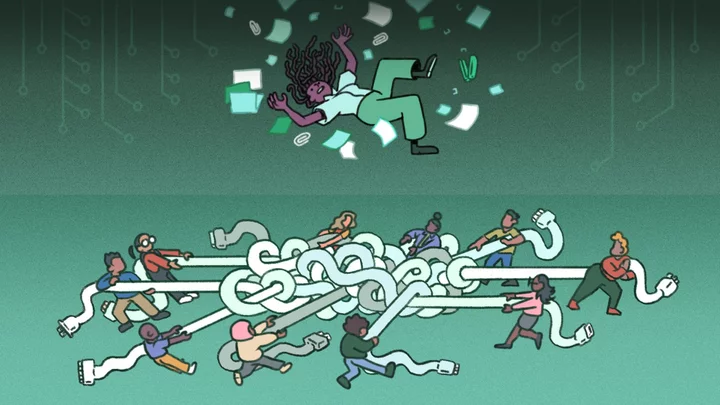After I'd been laid off for the first time in my life, my dad tried to cheer me up by repurposing a tongue twister of a joke he would always use when people would overstay their welcome at our home.
"It's better for them to miss you when you're gone, rather than for them to miss when you were gone. Son, they clearly missed not having you around, and that's why your job is gone."
I had just been let go from a part-time role, and there was an air of shame and disappointment that hung over my head. My dad, with his old-school Jamaican sense of humor, tried to get me to laugh at the situation.
Spoiler alert: I did not laugh at that joke. I was in a rough emotional state for a few weeks.
It's no secret that the tech industry has been going through a gigantic upheaval, challenged by factors including continued macroeconomic uncertainty, with tech companies resorting to layoffs to protect profit margins.
SEE ALSO: PayPal's layoffs are the latest in Big Tech's cutbacksAlthough the messaging around tech careers has taken an ominous tone over the past year, with LinkedIn feeds feeling like an endless rotation of people reminiscing or grieving their lost jobs, there's solid reason to hope and strategize for a better future.
The emotional journey of being laid off
First, let's acknowledge the giant elephant in the room: A layoff, no matter the circumstances, hits hard. However, that same disruption in employment can give you a prime opportunity to reassess your career and see who's truly in your corner. The strength of your connections, both online and off, can be a catalyst for recovery.
A layoff can trigger emotions like feeling betrayed, ambushed, and belittled. For many, the fear of financial ruin inches closer to becoming reality, and that only serves to heighten the already stressful emotional whirlwind.
In my experience, a sudden bout with impostor syndrome is also all but inevitable as questions centered around your self-worth and identity begin to creep into your mind. Anxiety about the future, embarrassment, and even depression can also follow.
You might experience an existential question gnawing at you: "If I'm not my job, then who am I?" Then there's anger, directed at the management, at the economy, or even at yourself for not seeing it coming — we tend to be the least kind to ourselves when we need it the most.
However, remember that these feelings are normal and shared by many others going through the same turmoil. Here's where the power of a supportive community comes into play.
"I don’t have problems; I have friends." - Clarence Avant, "The Black Godfather"Community: It's a word that echoes throughout the tech world, feeling like a full-blown cliche at times. However, when you see a professional network put in effort to support one of its own, that's where the true beauty of community shines, becoming the most apparent when we navigate hardships like a layoff.
In the wake of a job loss, the comfort and encouragement from people who understand your journey can be invaluable. Beyond emotional support and advice, engaging in online communities such as LinkedIn groups, industry-specific forums, or even local meetup groups can significantly expand a network that can help you bounce back.
Keep in mind that fostering meaningful relationships is more than just attending networking events or exchanging LinkedIn profiles, it's about genuine connections and shared experiences. The best way to create community is to find people who share the same genuine interests as you and identify other overlapping interests. I've been able to create some amazing working relationships by striking up conversations about anime, video games, and a plethora of non-work-related topics, which are so much easier to bond over than expense reports and company acquisitions.
One of the best examples I've ever seen of a community coming together to support one of its own was in a Discord server for Black gamers I was a part of. After dealing with office politics and microaggressions, one of our community members found themselves unexpectedly let go from a job for which they'd recently relocated and signed a fresh lease for their apartment. The server's entire community of more than 1,500 members got together for a job referral drive that successfully helped the person affected find a new job within a week.
How wild is that? Fired on a Friday but hired by the next Thursday? It's almost unheard of, but it happens — people love to help out those they like, and you never know what kind of network a fellow community member has access to.
Building community: Where to go and what to do
You might be wondering, "Jobfather, that's all well and good, but where can I even find these communities?" Don't worry, I got you — and, yes, I was introduced to this list of nearly 140 online groups, forums, and industry-specific communities through online communities I belong to.
Prioritizing the sincerity of friendship is the best way to have a relationship impact you in the professional sense. And, as you build these connections, actively participating in these community spaces allows you to showcase your skills, stay informed about industry trends, and demonstrate your value to potential employers.
Sometimes participating means commenting on posts, making threads on relevant topics, or even collaborating with people in the community on different projects. This approach can be expanded to platforms like Discord, Slack, and LinkedIn, starting with searching for groups or communities that align with your interests and professional goals. Join relevant servers, channels, or groups, and introduce yourself to the community.
Keep an eye on the activity within a group, and engage in conversations with the most active members by sharing your insights and asking questions. Don't hesitate to reach out through direct messages or connect requests, mentioning a common interest or shared experience as a conversation starter.
On platforms like Twitter, you can join relevant industry-specific conversations using hashtags or participate in Twitter chats to connect with professionals in your field. Twitter Spaces are among my favorite ways to find new communities as people connect through live audio conversations with transparency. Follow the people you find interesting, and engage with their tweets by liking, retweeting, and commenting thoughtfully. If a comment or thread from them resonates with you, consider chiming in and initiating a conversation.
There are also new platforms where you really may be able to make your mark since they're still in their infancy. Exploring emerging platforms like Spill, Mastodon, or Meta's Threads can provide unique opportunities to connect with like-minded individuals seeking meaningful professional connections.
Maybe this is petty, but I also like that there's a bit of a counterculture in building and leveraging your own online communities. Not everyone has an Ivy League alumni network to fall back on, but you can build one just as effective by properly investing in your online relationships.
Reframing a setback as an opportunity
A layoff, as brutal as it may feel, also presents an opportunity to reevaluate your career trajectory. As a career coach, a best practice that I teach my clients is to engage with professional communities to remain aware of emerging industry trends and technologies and find ways to incorporate those into their current career strategy.
Leveraging a layoff can include using the additional time you have to upskill and become more literate in those trends. For instance, utilization of artificial intelligence has been a commanding headline in the tech world lately: AI this, AI that, you can't go anywhere without someone bringing up the AI revolution. Having knowledge or skills in this area can provide a unique advantage by adding depth to your career path and enabling you to stand out in a crowded candidate pool.
SEE ALSO: How to prepare to thrive professionally in an AI-integrated workforceAnother added benefit of having a deep community is access to a group of people who can act as a sounding board for new ideas while also being able to provide valuable, informed feedback. Exploring the diverse career paths and success stories within your network can ignite inspiration and open doors you might not have considered.
Your community becomes your personal and professional safety net, catching you when circumstances threaten to pull you down. It really adds perspective to the sentiment, "It's not what you know, it's who you know," a phrase that gets thrown around in job search conversations all the time for good reason.
As we navigate the uncertain journey of layoffs, remember the power of community. It's not just about drawing strength and insight from it; your experience can equally benefit others. Open doors where you can, make introductions, provide insights. Think of your own personal brand and how you'd like to be seen among your peers. There are a lot of benefits that come from being seen as someone who gives to enrich their community rather than focus exclusively on how they can get ahead.
Find out about the different projects and initiatives people are working on, and try to find different ways your skills can help complement their vision and get them closer to their goals. You might be able to add another career success on your resume while also leaving a positive impact on someone and their perception of your skillset, which in turn gives further credibility to your personal brand.
Facing a layoff is tough, but with the support of a strong community and always keeping your eye on career development, it can be an opportunity for growth and new beginnings.
Mashable columns reflect the opinions of their writers.









